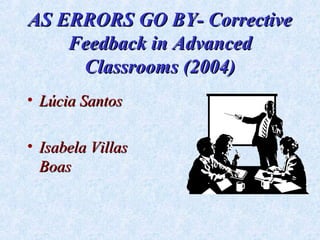
As errors go by (braz tesol)
- 1. AS ERRORS GO BY- Corrective Feedback in Advanced Classrooms (2004) • Lúcia Santos • Isabela Villas Boas
- 2. INTRODUCTION • Importance of the research • Linguistic Approach ⇒ Communicative Approach • Global x local errors ⇒ ESL x EFL settings • Communicative approach : develop communicative competence
- 3. Components of language competence (Bachman, 1990) • ORGANIZATIONAL COMPETENCE – Grammatical competence • Vocabulary, • Morphology • Syntax • Phonology/graphology – Textual competence • PRAGMATIC COMPETENCE – Illocutionary competence – Sociolinguistic competence
- 4. Important studies of corrective feedback • Error treatment in the classroom is imprecise, inconsistent, and ambiguous. (Allwright, 1975) • Feedback is confusing to learners in that they often receive contradictory signals simultaneously with respect to the content and the form of their utterances. (Fanselow, 1977).
- 5. Important studies of corrective feedback • Learners noticed forms that they were pushed to self-repair more than forms that were implicitly provided by teachers. (Slimani, 1992) • Recasts, similar to noncorrective repetitions, can be perceived by learners as positive evidence (information about what is acceptable in the target language) rather than negative evidence. (Long, 1996)
- 6. Important studies of corrective feedback • Whereas recasting of learner utterances was the most widely used type of feedback, it was the least successful way of corrective feedback in terms of uptake. The most successful ones were elicitation and metalinguistic feedback. (Lyster and Ranta, 1997) • Corrective feedback that promotes negotiation of form by allowing students the opportunity to self-correct or to correct their peers resulted in the highest rate of uptake. (Panova and Lyster, 2002)
- 7. Steps followed • observed 11 advanced classes and took notes of errors and corrections made during whole class interactions no correction explicit 6 20 correction 4 0 metalinguistic feedback recast 11 repetition 41 clarification request elicitation
- 8. Steps followed after observation • Questionnaires to teachers and students – 30 groups – all the groups observed were involved – data analyzed is based on 27 groups and 24 teachers • Analysis of data
- 9. Is it important to have your spoken errors corrected by the teacher? 10 6 0 yes (95,8%) no (0%) not sure (2.6%) blank (1.5%) 367
- 10. Students’ responses • We want to be able to speak better English. • I have to know what my mistakes are and why I am making them. • Because I can know what my mistakes are and try to improve. • To learn more. • So we can learn from our own mistakes.
- 11. Frequency of error correction according to students 200 190 very frequently (7.8%) frequently (30%) 150 116 somewhat frequently 100 (49.6%) rarely (10.7) 50 41 30 nonexixtent (0.02%) 1 4 blank (0.1%) 0
- 12. Frequency of error correction according to teachers 12 12 10 very frequently (16%) 8 8 frequently (50%) 6 4 somewhat frequently 4 (33%) rarely 2 0
- 13. What form of error correction is more effective for you? explicit correction 180 173 160 metalinguistic 140 134 feedback 120 113 recast 100 92 repetition 80 60 56 clarification request 40 24 20 elicitation 1 0 Types of corrective feedback ineffective Colunas 3D 8
- 14. Teachers’ preferred form of correction 20 19 explicit correction 18 17 16 15 metalinguistic 14 14 13 feedback 12 11 recast 10 8 repetition 6 4 clarification request 2 elicitation 0 Types of feedback
- 15. What form of error correction is most frequently used by your teacher? 160 explicit correction 143 140 metalinguistic 120 feedback 100 recast 80 84 80 52 repetition 60 38 40 clafification request 17 20 elicitation 0
- 16. Would you like to have more or less corrective feedback? 23 97 More (68%) Less (0,05%) It's enough (25%) 2 Blank (6%) 261
- 17. Questions for discussion: 1) What can you conclude from all the data presented? 2) Can the information presented be generalized to your teaching context? Explain. 3) How can the information presented influence your teaching?
- 18. CONCLUSIONS • Students definitely want and need more corrective feedback • Teachers tend to use more indirect ways of correction • Students tend to prefer more student-generated correction • Many times students don’t notice: – if the teacher is correcting them – how the teacher is correcting them • There is a lot of variability in students’ preferences of correction. To solve this problem, the teacher should investigate students’ preferences.
